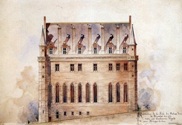Why "Aula Magna"?
The most ambitious architectural project of the 15th century.
The construction of the Aula Magna at the expense of the Brussels population was decisive in making Brussels the capital of the Burgundian Low Countries, in preference to Leuven, Mechelen, or Antwerp (not without analogy with the building of the Berlaymont at the expense of the Belgian State, decisive in making Brussels the capital of the European Union, in preference to Luxemburg, Strasburg or Paris). More precisely: in 1430, Philip the Good married and founded the Order of the Golden Fleece.
At the time, the Court was moving around from one city to another (Dijon, Mechelen, etc.). But the Duke indicated that Brussels could become his fixed capital.
In 1431, the City of Brussels decided to undertake the most ambitious architectural project of the century – the Aula Magna – located next to the ducal palace - and to extend the "warande" or Duke’s hunting ground. The Aula Magna was completed in 1459. From then until his death in 1467, Philip the Good spent most of his time in Brussels.
For a long time, the Aula Magna remained (perhaps until it burned down in 1731) the biggest civil building in the Low Countries and in that capacity the place where the States-General of the Low Countries met. The States-General constituted the first “democratic” organ in our regions that was more than local (bringing together representatives of a linguistically heterogeneous population).
The Aula Magna hosted many important events, such as:
-
•in 1515 the emancipation of Charles V, the most important historical figure who made Brussels his capital and his main place of residence.
-
•in 1555 the abdication of Charles V (depicted in a famous tapestry still hanging in the Brussels municipal council meeting room and which dates from 1716-18) in the presence of two men whose conflict would lead to the breaking up of the Lower Countries and to Brussels’ failure to become a major capital: William of Nassau, future Stadthouder of the Lower Countries, on whom Charles V was leaning when he entered the Aula Magna; Antoine Perrenot de Granvelle, who was to become the first Archbishop of Mechelen-Brussels and who Philip II asked to speak on his behalf, as he himself was incapable of speaking French. Nassau succeeded in getting Granvelle thrown out of Brussels in 1564. Granville succeeded in getting Nassau assassinated by a contract killer in 1584. Their conflict is still recorded in Brussels topography: the rue du Cardinal and the rue du Taciturne face one another at either side of the pond on the Square Marie-Louise, along which both the Nassau family and Cardinal Granvelle had a secondary residence.
-
•in 1566 the wedding of Alessandro Farnèse (son of Marguerite of Parma, illegitimate grandson of Charles V, illegitimate great-grandson of Pope Alessandro Farnèse, future mastermind of the recapturing by the Spaniards of the southern part of the Low Countries by Philip II after the capitulation of Antwerp in 1585).
-
•a few years later, on 5 April 1566, the Compromise of the Nobles, a list of claims inspired by Philip de Marnix de Sainte Aldegonde (the main Brussels intellectual of the time, born a few metres from the Aula Magna), was given by Henri de Brederode, leader of the “confederates” (members of the lower nobility of the Low Countries invited to the wedding festivities) to Marguerite of Parma. This was the first organized expression of the revolt of the Low Countries against religious intolerance and the Inquisition. It was met at the entrance to the Aula Magna by the famous sentence of Charles de Berlaymont (Granvelle’s finance minister, who remained in his job after Granvelle himself had been removed): “N’écoutez pas, Madame, ce ne sont que des gueux” – which explains not only why the confederates (soon to be led by William of Nassau) wanted to be referred to as “gueux” but also, much later, why the name “gueuze” was given to a Brussels beer.
Aula Magna can thus symbolize many things: from the strategic astutness of Brussels citizens to their beer, from multilingual democracy to religious tolerance, from the Cardinal to the Silent: to each his own interpretation…




